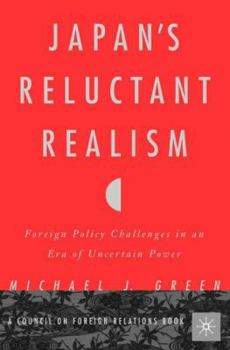Japan's Reluctant Realism: Foreign Policy Challenges in an Era of Uncertain Power
Select Format
Select Condition 
Book Overview
In Japan's Reluctant Realism , Michael J. Green examines the adjustments of Japanese foreign policy in the decade since the end of the Cold War. Green presents case studies of China, the Korean peninsula, Russia and Central Asia, Southeast Asia, the international financial institutions, and multilateral forums (the United Nations, APEC, and the ARF). In each of these studies, Green considers Japanese objectives; the effectiveness of Japanese diplomacy in achieving those objectives; the domestic and exogenous pressures on policy-making; the degree of convergence or divergence with the United States in both strategy and implementation; and lessons for more effective US - Japan diplomatic cooperation in the future. As Green notes, its bilateral relationship with the United States is at the heart of Japan's foreign policy initiatives, and Japan therefore conducts foreign policy with one eye carefully on Washington. However, Green argues, it is time to recognize Japan as an independent actor in Northeast Asia, and to assess Japanese foreign policy in its own terms.
Format:Paperback
Language:English
ISBN:1403962359
ISBN13:9781403962355
Release Date:September 2003
Publisher:Palgrave MacMillan
Length:351 Pages
Weight:1.25 lbs.
Dimensions:0.9" x 5.8" x 8.9"
Customer Reviews
1 rating
an excellent book on Japanese foreign policy
Published by Thriftbooks.com User , 23 years ago
This is an excellent book on Japanese foreign policy written by someone now working for the National Security Council. It draws upon on copious research including interviews conducted by the author, as well as Japanese and English language secondary source materials. Green convincingly argues that Japanese foreign policy is particularly driven by parochial domestic considerations, and in this respect the book is quite timely in light of the political changes occurring in Japan. I learned quite a bit from reading this book -- even regarding issues on which I thought my own prior knowledge was significant.





